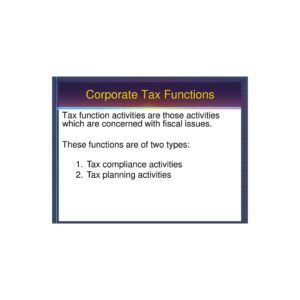![]()
Tax Planning for Corporate

Tax planning for corporate encompasses the deliberate formulation and execution of strategies, along with proactive measures taken by businesses, to efficiently handle their tax obligations. This approach ensures compliance with relevant tax laws and regulations while maximizing their tax position and overall financial standing. The goal of corporate tax planning is to minimize tax expenses, maximize tax benefits, and optimize the overall tax position of the company.
Here are some key aspects of tax planning for corporations:
1. Structuring:
Choosing the appropriate legal and organizational structure for the business can have significant tax implications. Tax planning involves considering factors such as the type of entity (e.g., corporation, partnership, limited liability company), jurisdiction, and ownership structure to minimize tax obligations.
2. Income Tax Planning:
Corporations engage in various strategies to minimize their income tax liabilities. This includes taking advantage of deductions, credits, exemptions, and incentives provided by tax laws.
Examples of income tax planning strategies include expense management, depreciation and amortization planning, research and development (R&D) tax credits, and utilizing tax losses.
3. International Tax Planning:
For multinational corporations, international tax planning is essential to effectively manage cross-border transactions, transfer pricing, and the allocation of profits among different jurisdictions.
It involves understanding tax treaties, utilizing tax-efficient structures, and managing global tax compliance to optimize the company’s overall tax position.
4. Capital Gains Tax Planning:
When a corporation sells an asset and realizes a capital gain, capital gains tax (CGT) may be applicable. Tax planning strategies for capital gains focus on minimizing the tax impact by considering exemptions, concessions, rollovers, and timing of asset sales. This may include utilizing the small business CGT concessions, capital gains tax discounts, or utilizing specific provisions applicable to particular types of assets.
5. Dividend Planning:
Corporations need to carefully plan the distribution of profits to shareholders to minimize the tax impact. Dividend planning involves considering factors such as franking credits, dividend imputation, and timing of dividend payments to optimize the after-tax returns for shareholders while ensuring compliance with dividend tax rules.
6. Research and Development (R&D) Incentives:
Many jurisdictions offer tax incentives and credits to encourage research and development activities. Tax planning for corporations includes maximizing the benefits available under R&D tax incentive schemes, such as claiming eligible R&D expenses and offsetting tax liabilities with R&D tax credits.
For more information visit this site: https://www.incometax.gov.in
It’s important to note that tax planning for corporations should be conducted in accordance with applicable tax laws and regulations. Seeking advice from tax professionals or tax consultants who specialize in corporate tax can help businesses navigate the complexities of tax planning and ensure compliance with relevant tax obligations while optimizing tax outcomes.
For further details access our website: https://vibrantfinserv.com
